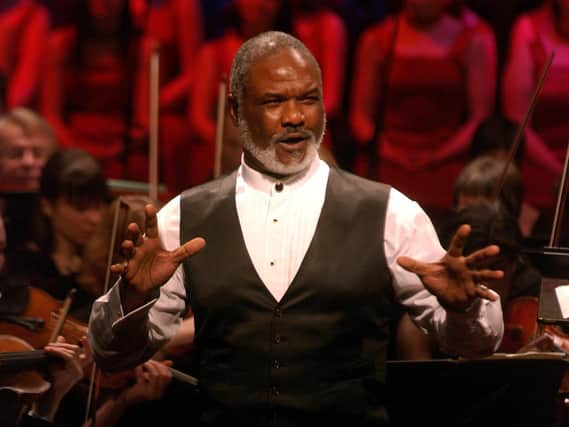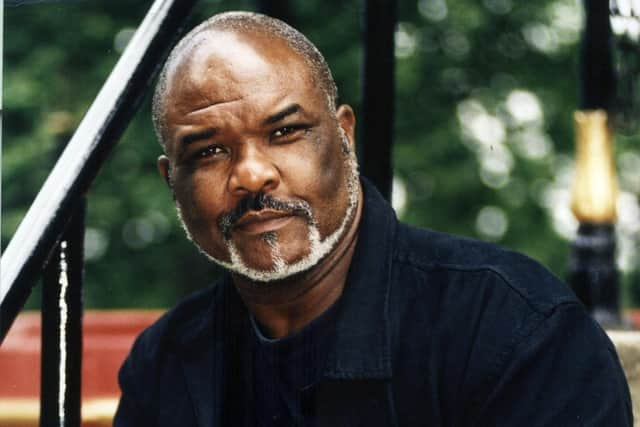Sir Willard White on the power of music and the great Maria Callas ahead of Harewood House concert for The Great Yorkshire Proms


The human voice is a powerful instrument capable of inducing all kinds of emotions. It can even move people to tears, as Sir Willard White discovered the other day as he returned to his London apartment. “I live in a high rise and was coming into the building and someone there stopped me and said ‘this is strange for me to say, but I heard you make a sound the other day and it hit me so hard and I started crying.’”
Sir Willard admits he was taken aback by the response but anyone who has heard the acclaimed opera singer perform will no doubt testify to the emotive power of his voice. It’s one that people can hear live when he appears at Harewood House in September at The Great Yorkshire Proms - alongside sopranos Sophie Evans and Peyee Chen and Tenors Unlimited, as well as host Aled Jones.
Advertisement
Hide AdAdvertisement
Hide AdThe Jamaican-born bass-baritone is widely considered one of the most gifted singers of his generation. He made his professional operatic debut with New York City Opera, where he played the character of Colline in La Bohème in 1974.


Since then he’s gone on to perform in many of the world’s great opera houses and has appeared as a soloist at numerous BBC Proms and performs regularly at the Royal Opera House, Covent Garden and the English National Opera, with Mephistopheles in The Damnation of Faust and Porgy in Porgy and Bess among his most celebrated performances.
He was knighted in 2004 for his services to music, however few would have predicted that from his humble beginnings in the Caribbean he would embark on such a remarkable musical journey.
Sir Willard was born in October 1946, in St Catherine, the son of a dockworker, Egbert, and Gertrude White. He was aware of music but it wasn’t a burning passion as he was growing up.
Advertisement
Hide AdAdvertisement
Hide Ad“It wasn’t part of my childhood, certainly not classical music. What I remember from my childhood days is every Sunday afternoon on the radio there was a station that allocated a certain period to so-called ‘relaxing music’ and Mantovani’s ‘strings’ playing pop songs with a string orchestra, and I also remember singing in music class. But operatic stuff? No.”
Life, though, has a funny way of taking our lives in unexpected directions and so it proved with Sir Willard. “I was singing in music class one day, not noticing the distinctive quality of my voice. I was hiding behind a couple of my classmates and as we were leaving the teacher, who was a Russian lady, called me over. I thought I was in trouble for something and she said ‘I want you to come and see me after school,’ and she was smiling so I thought maybe I wasn’t in trouble.”
He accepted the scholarship and began winning music competitions in Jamaica. Even so, he still didn’t envisage a career in music. “I had a dream of becoming an economist,” he says.
“Yes, I sang all throughout my childhood and I sang for my personal pleasure and I did some performances, but that was just a hobby. It was too fragile for me to think of committing myself to a life in music.”
Advertisement
Hide AdAdvertisement
Hide AdHe got an office job so that he didn’t have to rely on his family for support. “I wasn’t very good at the office work and I wasn’t very interested in it, and whenever there was a break I’d go to some far corner of the building and sing. One day I was leaving work to go for a rehearsal and I noticed the distinct pleasure I had leaving the office and the prospect of going to this rehearsal.”
This was the moment, at the age of 19, when he realised that perhaps he should pursue singing as a career. “I thought to myself, ‘you love it, why don’t you just try it for two years? And if I fail, then I can always go back.’” In the meantime, his father had heard about the Juilliard School in New York and encouraged his son to apply. In 1968, he was accepted by the Juilliard pending his audition. “I thought I would just sing the best I can and when they say ‘no’, I’ll just go back home.’” Only they said ‘yes,’ and not only that he earned another scholarship.
It was while at the Juilliard that he attended classes with Maria Callas. “She was magical and she made such an impression on me.” He recalls one encounter with her in particular. “I arrived for one of my classes and I was the only one in the elevator and the door opened and in walked the president of the Juilliard with Maria Callas. I tried to shrink into the corner and she looked at me and said, ‘well, it’s Willard White,’ and it just blew my mind that she knew my name. And she said, ‘hello Willard, how are you?’ And when she got out she said ‘goodbye Willard’ and I hadn’t said one word.”
His debut after graduating from the Juilliard was in La Bohème at the New York City Opera. It was a baptism of fire but one he came through with flying colours. “I had good reviews and positive responses from the audiences and I thought ‘wow, I’ve made it.’ And so next time I was not as nervous and I made more mistakes in that performance than I dreamt I could make. That taught me that you can’t take the performance for granted.”
Advertisement
Hide AdAdvertisement
Hide AdWhen he started out he didn’t fit the traditional image of an opera singer, so did he experience any racism in his early days?
“It wasn’t really regarded as racism. I remember in that first season I was contracted to do four performances and because things went so well I was given 18 performances.” These included roles in Turandot and Medea. “It was very clear [in the make-up department] that I had to be white. If you were on stage and doing certain characters you had to look white... It was the most horrendous thing. Can you imagine a black man being painted in a colour to look white? It was ridiculous,” he says.
“But I figured I was there and I’m going to be as good as I can be on stage so that all that surface stuff doesn’t matter. And to this day, it doesn’t matter what colour you are, if you commit yourself to what you’re doing, the human quality is more interesting than the colour.”
For all his success, though, he doesn’t see himself as a role model. “I’ve stayed in the race and I’ve managed to keep my voice healthy I feel, and I’m humbled by the whole thing. Singing has taught me that I can’t sing yesterday’s performance today. Every moment is a gift and it’s about exploring and asking myself ‘what can I do next?’”
Sir Willard White will be performing at The Great Yorkshire Proms, supported by the Yorkshire Symphony Orchestra, on Sept 4, at Harewood House. To buy tickets visit www.vivolive.co.uk
Comment Guidelines
National World encourages reader discussion on our stories. User feedback, insights and back-and-forth exchanges add a rich layer of context to reporting. Please review our Community Guidelines before commenting.
